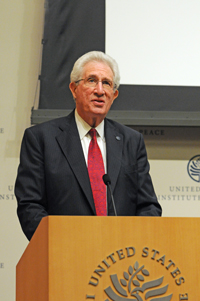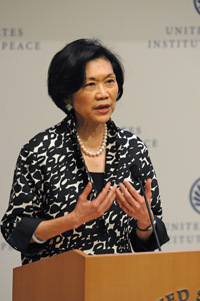U.S. Institute of Peace President Richard H. Solomon spoke at a special event at USIP on June 14 in recognition of National Flag day and to pay tribute to the diplomatic service of the ambassador of Singapore, Chan Heng Chee, who served in Washington, DC for 16 years. Solomon was joined by former USIP Executive Vice President Tara Sonenshine, now serving as Undersecretary of State for Public Diplomacy and Public Affairs.
U.S. Institute of Peace President Richard H. Solomon (left) spoke at a special event at USIP on June 14 in recognition of National Flag day and to pay tribute to the diplomatic service of the ambassador of Singapore, Chan Heng Chee (right), who served in Washington, DC for 16 years. Solomon was joined by former USIP Executive Vice President Tara Sonenshine, now serving as Undersecretary of State for Public Diplomacy and Public Affairs.
 |
 |
Following is the transcript of Solomon’s remarks:
Richard H. Solomon: Let me welcome you on a very special national day for our country, our national flag day. As you may know, this is also the 200th anniversary of the war of 1812, which inspired our national anthem that honors our flag. In that conflict, there was a battle just up the road at Fort McHenry in Baltimore, and after a night of bombardment by British warships, as you heard in the national anthem, our flag was still standing. So this holiday is an important way of celebrating the origins of our country.
In addition to recognizing our national holiday, we thought this was a good opportunity to honor the diplomatic corps, to recognize the flags of all the countries where the Institute is very active. In the Institute’s three decades, we have worked in more than 100 countries around the world.
This is also a very timely opportunity to recognize the exceptional service to the diplomacy of an ambassador who has enlivened the intellectual community of official Washington for 16 years, Ambassador Chan Heng Chee, a colleague and long-time personal friend.
As well, this is an opportunity to hear from another colleague and friend now serving in the U.S. government, Undersecretary of State for Public Diplomacy and Public Affairs Tara Sonenshine—until recently our executive vice president.
For those not familiar with the Institute and its work around the world, let me say a few words about USIP's role in our country's constellation of foreign policy and national security organizations.
We are a creation of Congress, which established our charter in 1984 and funds our work with annual appropriations.
Following the Vietnam War, a group of senators concluded that our country needed an organization dedicated to research, education and action in the skills of non-violent international conflict management. We were organized by Congress as a bipartisan, independent federal institution, empowered to innovate and educate in techniques of conflict management and peacebuilding.
Our work came into its own with the end of the Cold War. Today we live in a time when the character of international conflict has changed dramatically. Fortunately, we don’t have the great power confrontations and devastating wars that characterized the 20th Century -- the most violent and destructive era in history.
But today the world of international affairs is burdened with ethnic and religious conflicts, turmoil in weak and failing states, the security challenges of nuclear proliferation and terrorism, and the search for new approaches to dealing with non-military threats to our well being: economic instability; energy, health and food security issues; and environmental problems, among them.
Our government is now adapting its institutions which were designed 60 or more years ago to deal with Cold War challenges – to manage these issues. And the Institute of Peace, being small, agile and adaptive, is helping the country as it creates “whole of government”—civilian as well as military—capabilities to deal with this new era in international affairs.
Let me highlight some of our programs that have enabled USIP to cooperate with many of the countries represented here tonight:
Much of our recent work abroad has involved efforts to stabilize countries impacted by conflict and war. We partner with the Departments of State, Defense and AID in Iraq, Afghanistan, Pakistan, and Sudan (among many others) to promote political reconciliation and the rule of law, and the reconstruction of civil society organizations.
In the Philippines we have worked with the central government to mediate land disputes with Moro communities in the southern island of Mindanao that sustain local violence.
We train peacekeeping troops in Africa in negotiation and mediating skills—in partnership with the State Department’s African Contingency Operations Training and Assistance (ACOTA) program.
Here at home, we organize bipartisan policy development commissions and study groups to better inform our government about political approaches to dealing with long-standing intractable conflicts—in the Middle East, in North Korea—or how to prevent genocidal violence and mass killings of civilians.
Our research grants and senior fellowships have funded research into best practices in conflict management through hundreds of projects around the world. Among the more than 150 books published by the Institute of Peace Press, I should mention a recent volume summarizing the conflict mediation work of Sweden’s former foreign minister—a former president of the U.N. General Assembly and ambassador to Washington—Jan Eliasson.
We develop and train professionals in techniques of conflict management. Negotiating across cultures is a critical tool for all diplomats, and we have produced a dozen volumes highlighting the distinctive negotiating practices of countries ranging from Japan, China and North Korea to Russia, France and Iran—and even the United States! Indeed, our honoree today was an important contributor to our recently published book on American negotiating behavior.
The Institute's work is inspiring the creation of counterpart conflict management organizations around the world. Finland's former President Martti Ahtisaari has urged the EU to organize its own Peace Institute; and we see similar efforts under way today in Australia and even China.
Time does not permit me to detail our work in many other countries represented here tonight—in Nepal, Egypt, Tunisia and Burma—or the cooperation we have received from organizations and governments in France, the United Arab Emirates, South Africa and Singapore.
The key point is that in a time of great change in international affairs, the Institute of Peace is partnering with countries and organizations around the world in efforts to change the way we manage conflict: Putting more emphasis on preventive political measures and civil institution building, and less on the instruments of coercion and violence.
We are pleased that you have joined us today to recognize our opportunity to work together in the never-ending challenge of building a more peaceful world.
Explore Further
-
American Negotiating Behavior: Wheeler-Dealers, Legal Eagles, Bullies, and Preachers
By Richard H. Solomon and Nigel Quinney